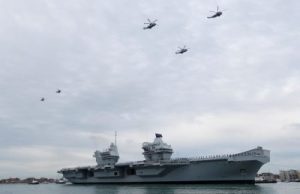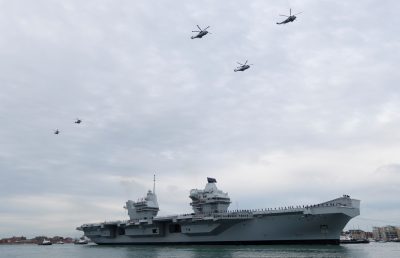 Author: Donald R. Rothwell, ANU
Author: Donald R. Rothwell, ANU
But care needs to be exercised in reading too much into what has been said. Unlike the United States, the UK does not have a distinct freedom of navigation program.

For example, in December 2016, when the Asia Times sought a clarification from the British Embassy in Washington on this issue, the Embassy indicated that ‘the UK does not conduct freedom of navigation operations, although it will continue to exercise its right to navigate through internationally recognised air ways and international waters as needed’.
The UK’s denial over conducting freedom of navigation operations (FONOPS) aligns with the recent statements by UK Foreign Secretary, Boris Johnson, and UK Defence Secretary, Sir Michael Falon, neither of whom directly mentioned FONOPS. In speaking about two new UK aircraft carriers that are expected to enter service by 2023, Boris Johnson said that ‘one of the first missions of our two vast new aircraft carriers will be to sail through the Straits of Malacca’. Sir Michael Fallon was less precise, observing that ‘We haven’t mapped out the initial deployments yet but, yes, you would expect to see these carriers in Indo-Pacific Ocean’.
On any interpretation, 2020 is the earliest that one of the new UK carriers will be sighted in the Asia Pacific — and the South China Sea in particular — and a great deal can happen in the meantime. In this respect, the applicable international law relationships between China and the United States, and China and the UK, need to be understood.
Both China and the UK, along with 164 other countries, are parties to the 1982 UN Convention on the Law of the Sea (UNCLOS), which entered into force in 1994. The United States is notably not a party to UNCLOS, and this immediately diminishes its capacity when engaging with China to promote adherence to the convention and law of the sea more generally. The UK and China are therefore better placed to address their law of the sea relationships through the UNCLOS framework.
This brings us to FONOPS, whether conducted formally as part of a challenge to excessive maritime claims — which is the US practice — or just as part of normal assertion of a navigational right. Navigation by foreign warships has long been contentious. The first decision of the International Court of Justice in 1949, in a casebrought by the UK against Albania, affirmed that the right of innocent passage through the territorial sea applied equally to warships and merchant vessels.
This right was subsequently recognised in Article 14 of the 1958 Geneva Convention on the Territorial Sea and Contiguous Zone.
The successor convention, UNCLOS, has a series of provisions that recognise the navigational rights of all ships — including warships — in the territorial sea, international straits, archipelagic sea lanes, and in the exclusive economic zone and high seas. All of these bodies of waters are present in or adjacent to the South China Sea. Accordingly, any movement of foreign warships through those waters represents an exercise of the entitlement of the freedom of navigation.
Unsurprisingly, the closer a foreign warship is to the coast, the more the adjacent coastal state will want to exercise certain controls or seek guarantees as to its security. The right of innocent passage reflects this concern and, according to UNCLOS, all foreign ships in the territorial sea must not engage in threatening activities.
China, however, seeks to impose additional conditions on foreign warships within its territorial sea. Upon ratifying the UNCLOS in 1996, China indicated that provisions ‘concerning innocent passage through the territorial sea shall not prejudice the right of a coastal State to request, in accordance with its laws and regulations, a foreign State to obtain advance approval from or give prior notification to the coastal State for the passage of its warships through the territorial sea of the coastal State’.
The UK has rejected this type of assertion made by China and others and in 1997 indicated that it did not accept UNCLOS declarations that ‘purport to require any form of notification or permission before warships or other ships exercise the right of innocent passage or freedom of navigation’.
These differing positions between China and the UK on the UNCLOS regarding prior notification and authorisation for warship navigation, which is also contested by the Netherlands, Germany, Italy and the United States, sets the scene for UK carrier navigation through the South China Sea in 2020 and beyond.
Donald R. Rothwell is Professor of International Law at the College of Law, The Australian National University.



